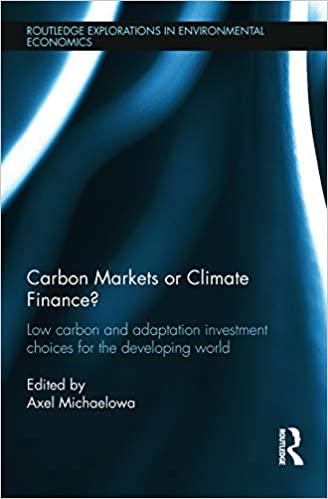Question
1. Which one of the following statements is not correct? A. The risk-free rate of return has a risk premium of 0.0. B. The risk
1. Which one of the following statements is not correct? A. The risk-free rate of return has a risk premium of 0.0. B. The risk premium is the rate over and above the risk-free rate. C. Risks and expected return are inversely related. D. The higher the expected rate of return, the wider the variance of returns. E. Risk premiums are related to the standard deviation of returns.
F. None of the above.
Un-systematic risk is: A. totally eliminated when a portfolio is fully diversified. B. defined as the market risk. C. risk that affects a large number of securities. D. measured by beta. E. all of the above.
F. none of the above
The lower the standard deviation of returns on a security, the _____ the expected rate of return and the _____ the risk.
A. lower; lower
B. lower; higher
C. higher; lower
D. higher; higher
Which one of these represents systematic risk?
A. Major layoff by a regional manufacturer of power boats
B. Increase in consumption created by a reduction in personal tax rates
C. Surprise firing of a firm's chief financial officer
D. Closure of a major retail chain of stores
E. Product recall by one manufacturer
F. None of the above
Based on the Capital Asset Price Model, the expected return on a security is not affected by the:
A. securitys unique risks.
B. risk-free rate.
C. securitys risk premium.
D. securitys beta.
E. market rate of return.
F. None of the above
. An increase in the tax rate of a firm that uses debt will:
A. decrease the cost of preferred stock.
B. increase both the cost of preferred stock and debt.
C. decrease the firms cost of capital.
D. decrease the cost of equity capital.
E. increase the firms WACC.
Western Electric has a target capital structure of 45 percent common stock, 5 percent preferred stock, and 50 percent debt. Its cost of equity is 14 percent, the cost of preferred stock is 8 percent, and the pre-tax cost of debt is 8 percent. What is the company's WACC if the applicable tax rate is 40 percent?
A. 9.10 percent B. 9.29 percent C. 10.02 percent D. 10.57 percent E. 10.70 percent
Which one of the following statements is not correct? A. Using the Capital Asset Model requires the firms beta. B. The risk-free rate is approximated by T-Bills. C. A firms sales growth rate determines the firms systematic risk. D. A firms common stock is riskier than its preferred stock. E. Lowering a firms risk will increase the firms value.
F. None of the above
The standard deviation measures the _____ of a security's returns over time.
A. average value
B. frequency
C. volatility
D. mean
E. arithmetic average
F. geometric average
Step by Step Solution
There are 3 Steps involved in it
Step: 1

Get Instant Access to Expert-Tailored Solutions
See step-by-step solutions with expert insights and AI powered tools for academic success
Step: 2

Step: 3

Ace Your Homework with AI
Get the answers you need in no time with our AI-driven, step-by-step assistance
Get Started


